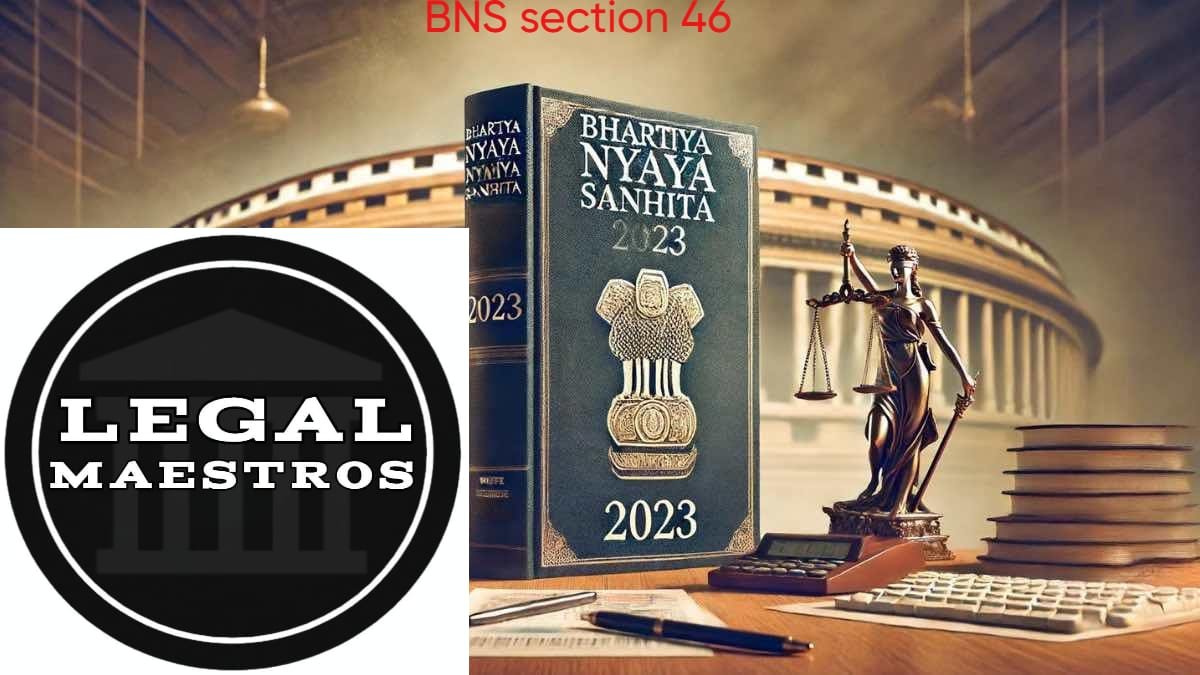
What is Abetment? A Simple Explanation of Section 46, BNS 2023 with Real-Life Illustrations
A comprehensive set of laws on abetment has been introduced by the Bharatiya Nyaya Sanhita (BNS), 2023, which has replaced the Indian Penal Code (IPC) and went into effect on July 1, 2024. These provisions explain the situations under which an individual can be held accountable for promoting or assisting a crime.
Determining What Abetment Is
One is considered to have aided and abetted an offence in accordance with Section 46 of the BNS if they:
1. Encourage another person to engage in criminal activity.
2. Take part in a plot to criminally commit an act of violence.
For any queries or to publish an article or post or advertisement on our platform, do call at +91 6377460764 or email us at contact@legalmaestros.com.
3. Complicitly assist another person in the commission of a criminal act.
An important point to note is that abetment can take place even if the primary offense is not committed. In the event that person A encourages person B to commit murder, but the latter declines to carry it out, then the former is still guilty of abetment.
For More Updates & Regular Notes Join Our Whats App Group (https://chat.whatsapp.com/DkucckgAEJbCtXwXr2yIt0) and Telegram Group ( https://t.me/legalmaestroeducators )
For any queries or to publish an article or post or advertisement on our platform, do call at +91 6377460764 or email us at contact@legalmaestros.com.
Explanations and Illustrations of Critical Importance
This is the first explanation: abetment encompasses the illegal omission of an act, even if the abettor is not legally obligated to carry out the act in question.
Example 2: [Explanation] If the act that was assisted is not carried out, the offence of abetment is considered to have been committed.
The Third Explanation: It is not necessary for the person who was assisted to be capable of committing a crime. For instance, if A encourages a kid under the age of seven to engage in a behavior that would be considered a criminal offense if it were carried out by an adult, then A is liable for abetment.
For any queries or to publish an article or post or advertisement on our platform, do call at +91 6377460764 or email us at contact@legalmaestros.com.
This is an illustration: One of the individuals, B, who is not of sound mind, is the one who starts a fire in a residence. Despite the fact that B is unable to comprehend the act, he commits it. A is responsible for abetment, but B is not guilty of the crime.
Cooperation via a Conspiracy
Conspiracy are another form of abetting that might take place. Individuals are guilty of abetment by conspiracy if they provide their consent to conduct a crime and then carry out their agreement to do the crime.
This is an illustration: The plan is for A and B to poison Z. Z’s death is brought about by A’s acquisition of the poison, which is then administered by B. A and B are both responsible for the crime of murder by abetment by conspiracy together.
For any queries or to publish an article or post or advertisement on our platform, do call at +91 6377460764 or email us at contact@legalmaestros.com.
Consequences for Committing Abetment
The BNS sets precise consequences for those who aid and abet criminals.
Section 49: The abettor is subject to the same degree of punishment as the principal offender in the event that the act that was abetted is carried out and there is no special punishment given.
Section 50: [Section 50] The person who is aided is penalized in the same manner as if the conduct was committed with the abettor’s intention, even if the person who is assisted commits the act with a different intention.
For any queries or to publish an article or post or advertisement on our platform, do call at +91 6377460764 or email us at contact@legalmaestros.com.
Section 51: [Section 51] If a different act is committed than the one that was aided, but it is a probable outcome, then the person who abetted the second act is responsible for the first act.
Section 52: [Section 52] If both the act that was done and the act that was assisted are considered separate offenses, then the abettor may be penalized for both of them.
Section 53 stipulates that if the act that was abetted results in a different impact than what was intended, and the person who abetted it understood that this was likely to occur, then they are responsible for the actual effect.
For any queries or to publish an article or post or advertisement on our platform, do call at +91 6377460764 or email us at contact@legalmaestros.com.
* According to Section 54, the abettor is considered to have committed the offense if they were present during the conduct of the offense.
Aid Across International Boundaries
Abetment containing elements that traverse international borders is addressed in Sections 47 and 48:
Assisting in the commission of crimes committed outside of India is a violation of Section 47.
For any queries or to publish an article or post or advertisement on our platform, do call at +91 6377460764 or email us at contact@legalmaestros.com.
Abetment outside of India for offenses committed within India is a violation of Section 48.
Individuals are unable to avoid legal responsibility by conducting business across international borders thanks to these provisions.
The Bharatiya Nyaya Sanhita, 2023, offers a comprehensive framework for dealing with the issue of abetment. This framework ensures that persons who encourage or assist offenses are held accountable, even if the primary offense is not finished or is done under other conditions.
For any queries or to publish an article or post or advertisement on our platform, do call at +91 6377460764 or email us at contact@legalmaestros.com.





![Research Assistantship @ Sahibnoor Singh Sindhu, [Remote; Stipend of Rs. 7.5k; Dec 2025 & Jan 2026]: Apply by Nov 14, 2025!](https://legalmaestros.com/wp-content/uploads/2025/11/Gemini_Generated_Image_s0k4u6s0k4u6s0k4-768x707.png)
![Karanjawala & Co Hiring Freshers for Legal Counsel [Immediate Joining; Full Time Position in Delhi]: Apply Now!](https://legalmaestros.com/wp-content/uploads/2025/11/Gemini_Generated_Image_52f8mg52f8mg52f8-768x711.png)
![Part-Time Legal Associate / Legal Intern @ Juris at Work [Remote]: Apply Now!](https://legalmaestros.com/wp-content/uploads/2025/11/ChatGPT-Image-Nov-12-2025-08_08_41-PM-768x768.png)
![JOB POST: Legal Content Manager at Lawctopus [3-7 Years PQE; Salary Upto Rs. 70k; Remote]: Rolling Applications!](https://legalmaestros.com/wp-content/uploads/2025/11/ChatGPT-Image-Nov-12-2025-08_01_56-PM-768x768.png)